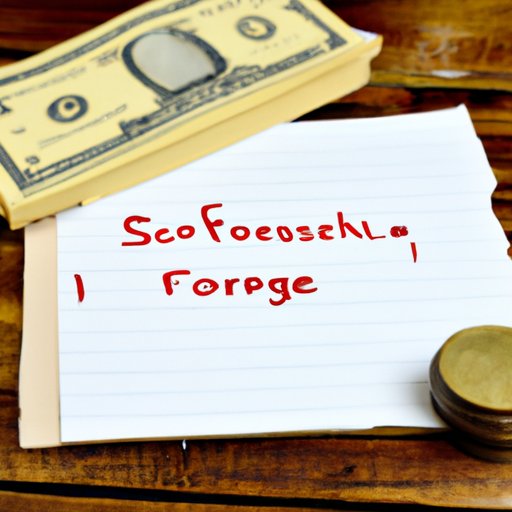
Do You Get Any Money If Your House is Foreclosed?
Foreclosure is a difficult process that nobody wants to go through. It is a term used when lenders take possession of the property to recover the money the homeowner owes. Foreclosure typically happens when a homeowner fails to keep up with mortgage payments.
Understanding Foreclosure: What Happens to Your Finances after Losing Your Home
Foreclosure is a legal process in which the lender takes possession of the property because the homeowner cannot pay their mortgage. The foreclosure remains on the credit report for seven years and affects one’s credit score. During the foreclosure process, the lender will typically sell the property at an auction and use that money to pay off the mortgage.
If a homeowner fails to pay the mortgage, the lender may initiate the foreclosure process. Lenders can initiate foreclosure either judicially or non-judicially. The main difference between the two is that judicial foreclosure requires a court order, while non-judicial foreclosure does not. As a result, non-judicial foreclosures tend to be faster than judicial foreclosures.
Foreclosure can negatively impact future borrowing potential. It can make it difficult to get approved for a new loan or may require a higher down payment, and higher fees.
The Financial Consequences of Foreclosure: A Guide for Homeowners
There are many financial consequences of foreclosure that a homeowner should be aware of. One of these is the deficiency judgment. This is when the proceeds from the sale do not cover the amount owed on the mortgage. The lender may ask the homeowner to pay the difference. Another consequence is the tax implications of foreclosure. Depending on state law, the homeowner may have to pay income tax on the deficiency amount. The credit score damage is also a major consequence as it will remain on the credit report for seven years.
For example, suppose you owe $100,000 of your mortgage, and your lender sells your property for $80,000. You could potentially still owe your lender the remaining $20,000 under a deficiency judgment. In this case, the homeowner may need to consult a bankruptcy attorney to learn how they may alleviate the deficiency judgment.
Does Foreclosure Mean You’re Out of Money? The Answer Might Surprise You
Many homeowners assume that after they lose their homes through foreclosure, they are out of money. However, some can still receive money from the foreclosure sale. When the property is sold, a homeowner can receive a surplus check. A surplus check is the difference between the mortgage balance and the sale proceeds.
A short sale, unlike a foreclosure sale, occurs when the lender agrees to accept less than what is owed on a loan. Typically, the homeowner requests a short sale when they cannot make their mortgage payments. A short sale can be a smart option for those who want to avoid foreclosure or avoid a deficiency judgment.
In some cases, the foreclosure sale can result in large sums of cash. For instance, a homeowner with a mortgage balance of $400,000 and a sales price of $500,000 could potentially receive a surplus check $100,000 or more.
Exploring Your Options: The Different Financial Outcomes of Foreclosure
There might be alternative options for individuals faced with foreclosure, such as a loan modification. Homeowners can typically request a loan modification when they cannot make their mortgage payments. A modification primarily changes the loan terms, lowering the payment amount and making it more affordable.
Short sales are also an alternative to foreclosure. Short sales can offer many of the same advantages as a deed in lieu of foreclosure or foreclosure avoidance program. In most cases, the short sale process precedes foreclosure proceedings, allowing the homeowner to avoid a deficiency judgment.
However, it’s important to weigh the pros and cons of each option before deciding whether to move forward with a short sale, deed in lieu, or foreclosure avoidance program.
Foreclosure 101: What Homeowners Should Know About Their Finances
Foreclosure is a complex process that homeowners should be aware of. It’s important to know the legal and financial rights of those going through foreclosure. Homeowners have the right to work with their lenders to avoid foreclosure and the right to review and dispute documentation related to their mortgage.
Maintaining good communication with your lender is critical throughout this process. Homeowners who cannot make their payments should be upfront with their lender and request assistance as soon as possible.
From Foreclosure to Financial Recovery: How to Rebuild Your Wealth After Losing Your Home
In the aftermath of a foreclosure, there are several steps homeowners can take to rebuild their finances. One of these is to repair their credit score. This can be done by making timely payments on other financial obligations, disputing errors on credit reports and paying off credit cards.
Homeowners can also begin to save for future homeownership. It’s important to maintain a good financial track record and work to improve their credit score so they can qualify for a new mortgage in the future.
Conclusion
In conclusion, foreclosure can be a difficult and complex process to navigate, and it can have significant financial consequences. However, homeowners who understand the process, explore their options, and work with their lenders can get through a foreclosure with minimal damage to their finances. It’s important to remain proactive throughout the process and take advantage of all available resources to rebuild the credit score.




